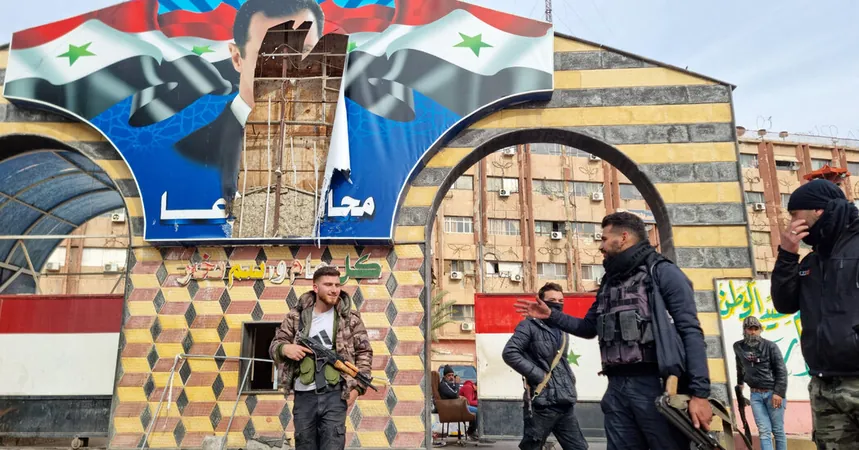
Iran's Sudden Withdrawal from Syria: A Historical Shift in Middle Eastern Dynamics
2024-12-07
Author: Wei
Iran's Dramatic Pivot
In a dramatic pivot, Iran, a long-standing ally of Bashar al-Assad's Syrian regime, has begun evacuating its military personnel and diplomats from Syria at a critical juncture when the Assad government faces renewed threats from advancing rebel forces. For over 40 years, Iran has invested heavily in Syria, establishing military bases and weapon supply chains that served as strategic outposts to support its regional militant allies. But as momentum shifts on the ground, the future of Iran's presence in Syria has become increasingly uncertain.
Increasing Alarm Over Syrian Losses
As the Syrian Army faces substantial territorial losses against rebel factions, Iranian officials have expressed growing alarm. After a particularly tumultuous year marked by regional upheavals—starting with a deadly Hamas attack on Israel in early October—the Iranian government appears to be scrambling. Rebel forces have swiftly advanced through key cities like Aleppo, Hama, and Deir al-Zour, raising fears of an imminent collapse of Assad's regime.
Implications for the Axis of Resistance
The implications of Iran's withdrawal extend far beyond Syria. The so-called “axis of resistance”—which includes Hezbollah in Lebanon, various factions in Iraq, the Houthis in Yemen, and Palestinian militant groups—faces potential fragmentation if Iran is unable to maintain its foothold in Syria. Analysts suggest that Israel and its Arab allies could gain significant strategic advantages amid this turmoil.
Critical Nature of Syria for Iran
Hassan Shemshadi, an expert on Iranian proxy militias, articulated the critical nature of Syria for Iran, stating, 'For Iran, Syria has been the backbone of our regional presence. Everything that Iran sent to the region went through Syria.' With Iran’s operational capacity severely compromised, its ability to project power across the region is jeopardized.
Public Commitment vs. Private Concerns
Although Iranian officials publicly maintain their commitment to support Assad, the precarious situation has prompted private concerns. Recent statements from high-ranking officials indicate a growing recognition that the fall of the Syrian government under Islamist factions might be inevitable. Mohammad Ali Abtahi, a former Iranian vice president, highlighted the potential ramifications, suggesting that such outcomes could tilt the balance of power significantly in favor of Israel.
Shifts in Rhetoric
In a bizarre transformation of rhetoric, Iranian state media shifted its portrayal of the Sunni rebels from “infidel terrorists” to “armed groups” amid changing alliances and realities on the ground. This reflects a broader strategy by Iran to safeguard its interests, with internal reports indicating panic as its proxy forces are forced to retreat.
Visual Indicators of Crisis
Further complicating matters, social media footage from Revolutionary Guard-affiliated accounts captured the almost-empty Shiite shrine near Damascus, amplifying the sense of crisis. The messaging appears to illustrate the deepening disarray within Iranian circles, as evidenced by fading hopes for a successful counter-offensive.
Dialogue with Rebel Factions
Another critical development occurred this week, wherein the main rebel faction, Hayat Tahrir al-Sham, reportedly communicated with Iran, assuring protection of Shiite sites and a ceasefire of sorts in exchange for an uncontested withdrawal of Iranian forces. This unprecedented dialogue marks a significant pivot in the Middle Eastern conflict landscape.
Origins of Iran's Military Involvement in Syria
Iran's military involvement in Syria began in 2012, with the intention of bolstering Assad's regime and combating both domestic and global adversaries, including the Islamic State. However, in recent months, escalating Israeli strikes on Iranian assets in Syria, coupled with Hezbollah’s weakened state following clashes with Israel and the Russian focus on its own war in Ukraine, have left Tehran vulnerable.
Challenges for Iran's Military Logistics
Desperate to maintain control over vital supply routes and partnerships, Iran has faced additional pressures as it attempts to coordinate troop movements amid threats from Israel of military action should any Iranian forces mobilize within Syria. Recent disruptions of flights destined for Damascus underscore the risks Tehran now faces amid its fraying alliances.
Future Ramifications for Regional Security
As Iran navigates this precarious moment, the ramifications for regional security and balance of power are profound, prompting analysts to monitor closely how this withdrawal will reshape Middle Eastern geopolitics in the months to come.


 Brasil (PT)
Brasil (PT)
 Canada (EN)
Canada (EN)
 Chile (ES)
Chile (ES)
 España (ES)
España (ES)
 France (FR)
France (FR)
 Hong Kong (EN)
Hong Kong (EN)
 Italia (IT)
Italia (IT)
 日本 (JA)
日本 (JA)
 Magyarország (HU)
Magyarország (HU)
 Norge (NO)
Norge (NO)
 Polska (PL)
Polska (PL)
 Schweiz (DE)
Schweiz (DE)
 Singapore (EN)
Singapore (EN)
 Sverige (SV)
Sverige (SV)
 Suomi (FI)
Suomi (FI)
 Türkiye (TR)
Türkiye (TR)